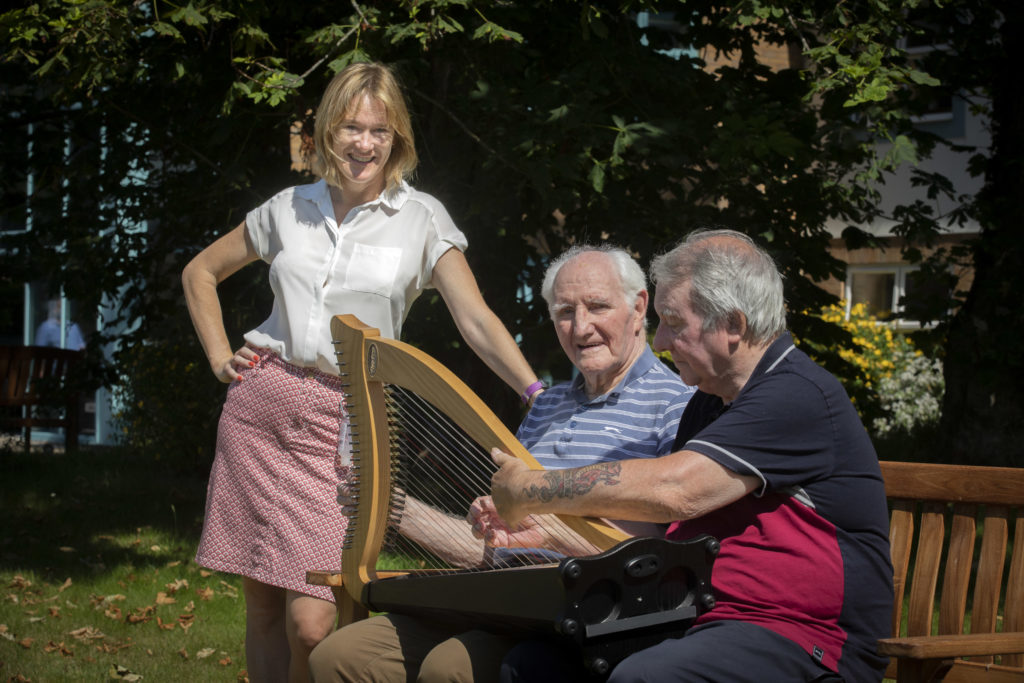
A musician in residence at a care organisation has been hailed as a “Covid heroine” for keeping the residents singing throughout the pandemic.
Nia Davies Williams, 49, has been conducting daily singing sessions to raise the spirits at Pendine Park’s Bryn Seiont Newydd care home in Caernarfon.
According to Nia, it was only because she is a permanent employee that she was crucially able to continue the music sessions which are so loved by residents living with dementia.
Pendine Park owners Mario and Gill Kreft made a point of recruiting Nia as a resident musician when the purpose-built home opened in 2015, having already employed an artist in residence 20 years before that.
Nia said: “It was an unusual step to make, but because of Mario and Gill’s passion for music, they understood the importance of this medium for people living with dementia.
“They shared a vision that music would be a central feature of life at the care home.”
Mum of three Nia, who lives with her partner nearby in Caernarfon, said: “It’s quite a unique situation that I am in here at Bryn Seiont Newydd in that I’m actually employed as a resident musician, whereas mostly with care homes and nursing homes they have people coming in on a purely freelance basis from time to time.
“All of those outsider visits had to stop in one fell swoop with the Covid lockdown restrictions. But because I’m employed as a member of staff by Pendine Park I was able to keep on coming into work. It was a challenge but I had to just try to find a way of us continuing to make music together safely and by following the rules.”
The sessions proved to be a salvation for elderly residents as they struggled with the challenges of going through lockdown without seeing their beloved families.
Nia said: “One to one conversation and loving interaction with friends and family is very important for anyone living with dementia and for their families also.
“We were able to facilitate activities on screen and via online streaming but this doesn’t work so well with people who have various forms of dementia.
“But music just flows. It was a way of involving families as well. They might not have had a coherent conversation on the phone or via Facetime but they could see their loved ones singing and see that they were enjoying that and it opened up an important avenue of communication.”
For her university masters degree Nia studied the relationship between music and dementia and how singing or listening to music can alleviate some of the isolation of dementia symptoms.
Now an acknowledged expert in the field, she explained that research has shown how music stimulates both sides of the brain.
She said: “Because of this for some reason musical memories seem to be spared from eradication even among those for whom a simple conversation seems to be quite impossible.
“The benefits for the residents of continuing their music therapy were enormous.
“The home has a spacious music room, and we’re used to welcoming local choirs until the music room is bursting with music.
“I had to pull the plug on these visits straight away, plus we could not bring the residents together into the music room as one big crowd.
“The care home has12 lounges with approximately nine residents in each lounge. Movement between lounges had to be restricted in case there would be a Covid-19 infection.
“I had to think of an idea of how to deliver live music safely to residents. By liaising with a few local schools, I managed to acquire four unused school pianos and placed them at strategic locations in the home.
“I also used my Celtic harp during the mini-music sessions. Strict rules had to be adhered to, so a mask, visor, and a bucket of anti-bacterial wipes became my daily tools as well as changing my clothes on arriving and leaving my own home.
“The ability to sing remains with most people with dementia. It was pure pleasure to hear tears of joy from one daughter as her father sang the popular Welsh hymn Calon Lân down the phone while I accompanied him on piano.
“Another man sang Watching the White Wheat to the harp’s accompaniment while his son watched and listened through Facetime. This was a special way of connecting – often the only way – and families found it invaluable.”
One Bryn Seiont Newydd resident, David Edwards, was thrilled the music continued and he praised Nia’s “excellent” leadership skills.
David said the sessions hugely relieved any feelings of anxiety he had about the worrying news of the pandemic.
He said: “You’ve got to go far afield to beat our choir here. Welsh singing, you can’t beat it. It makes me feel great. It did bring me happiness. It doesn’t matter what’s going on, when I can sing I am happy.”
David added: “You couldn’t wish for a better conductor. Nia’s excellent and she’s a nice person to go with it. She’s very pleasant, very kind. You can’t ask for more.”
Bryn Seiont Newydd manager Sandra Evans praised Nia’s hard work throughout lockdown.
She said: “It has been a massive challenge for us all. Every member of staff has given 100 per cent and we will never forget how selflessly they have stepped up in the must difficult circumstances.
“For Nia it has been non-stop, delivering the entire music programme herself without being able to call on the support of visiting choirs or fellow musicians. But she has been an incredible musical heroine without a doubt.
“She’s instrumental in raising the spirits of so many residents and their families. We are proud as punch to have her as our resident musician.
“The arts have always been an integral part of daily life here and the music hasn’t stopped at Bryn Seiont Newydd.”